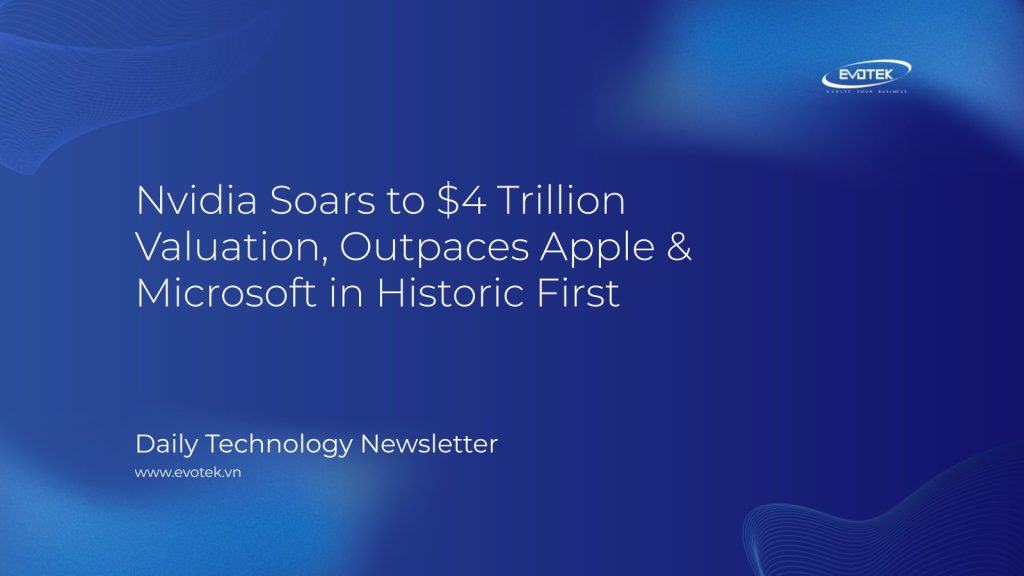New York, NY – In a groundbreaking moment for the tech industry, Nvidia on Wednesday briefly achieved a staggering $4 trillion market valuation, marking it as the first publicly traded company to reach this monumental milestone. The chipmaking titan’s stock surged by 2.76% immediately after market opening, pushing its market capitalization past the $4 trillion threshold for an intraday record high.
Although Nvidia later pared some of its gains, it concluded the trading day up by 1.8%, settling its market value just shy of the $4 trillion mark. This remarkable achievement sees Nvidia pull ahead of tech giants Apple and Microsoft, both of whom have recently vied for the title of the world’s most valuable company.
Nvidia’s Ascent: Fueling the AI Revolution
Nvidia’s meteoric rise, with its stock soaring approximately 21% this year, is largely attributed to its pivotal role in powering the global artificial intelligence (AI) boom. The US-based chipmaker’s graphics processing units (GPUs) are the essential backbone for data centers operated by leading tech firms such as Microsoft, Amazon, and Google, which are critical for their advanced AI models and cloud services. Experts anticipate a sustained surge in AI investments, with global spending on AI infrastructure projected to exceed $200 billion by 2028, according to market research firm The International Data Corporation.
The company’s financial performance underscores this growth, reporting $44.1 billion in revenue for the quarter ending in April, a robust 69% increase year-over-year.
“There is one company in the world that is the foundation for the AI Revolution and that is Nvidia,” commented Wedbush Securities analyst Dan Ives in a June 27 research note. He further reiterated on Wednesday that this is a “historical moment for Nvidia,” emphasizing its central role in the AI Revolution.
Innovation and Expansion Beyond Gaming
While Nvidia initially gained prominence for its GPUs among PC gamers, its strategic focus has profoundly shifted. The company is now at the forefront of developing cutting-edge AI models designed to power autonomous robots and vehicles. At its annual developers conference in March, Nvidia unveiled Blackwell Ultra, an enhanced version of its highly sought-after Blackwell chip, engineered to support more sophisticated AI reasoning capabilities.
This historic $4 trillion valuation follows Nvidia’s achievement of a $1 trillion market cap in May 2023, showcasing an accelerated pace of growth. Dan Ives also predicts that Microsoft, currently valued around $3.77 trillion, is likely to cross the $4 trillion threshold this summer.
CEO Jensen Huang: A Driving Force
Nvidia’s indispensable position in the AI “gold rush” has propelled its CEO, Jensen Huang, into the ranks of the world’s wealthiest individuals. As of Tuesday, Bloomberg Billionaire’s Index estimated his net worth at $140 billion, positioning him as the tenth richest person globally. Huang’s profile has extended beyond the tech sphere, with his involvement in high-profile events, including accompanying President Donald Trump on a Saudi Arabia trip in May and Nvidia’s partnership in Project Stargate, a $500 billion AI infrastructure initiative championed by the President.
Navigating Challenges and Future Prospects
Nvidia’s success has not been without its hurdles. Concerns arose earlier this year with the emergence of Chinese startup DeepSeek, whose powerful yet reportedly low-cost AI model sparked debate over the necessity of expensive chips, leading to a temporary dip in Nvidia’s stock in January. Furthermore, the company has been impacted by the ongoing US-China tech rivalry, stating it missed out on $2.5 billion in potential revenue for the fiscal quarter ending in April due to export restrictions on its H20 AI chips to China.
Despite these headwinds, Nvidia shares have demonstrated remarkable resilience, rallying almost 74% since early April after experiencing a 37% tumble between January and April.
CEO Jensen Huang remains optimistic about future growth, stating during Nvidia’s May earnings call that AI will be essential for “every country” and “every industry,” from software and healthcare to finance, retail, and manufacturing. Wall Street analysts largely concur with this positive outlook. Investment firm Loop Capital, in a June research note, even projected Nvidia could reach a staggering $6 trillion market cap by 2028, citing its near-monopoly on critical AI technology as a key factor in its sustained amplification of fundamentals.

 日本語
日本語 한국어
한국어 Tiếng Việt
Tiếng Việt 简体中文
简体中文